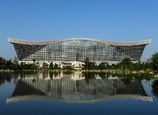
"While the benefits of direct convertibility between the renminbi and other currencies are obvious, including cutting the costs of exchange and reducing the risks brought by the fluctuation of the US dollar, it can also bring some risks to companies and regions in China whose growth is driven by foreign trade," said Liu Yang, a foreign exchange analyst with Shanghai Gaofu Consultancy.
Currently, the yuan is directly convertible to the yen and the Australian dollar. New Zealand and China are in an early stage of negotiations for direct convertibility of each other's currencies, according to a Reuters report on May 26.
"One important step to make the renmibi more internationalized is to use more yuan in direct investment overseas", said Nathan Chow, vice-president and economist of group research with DBS Bank (Hong Kong) Ltd.
Chow said that only about 6 percent of China's outbound direct investment uses renminbi, while 36 percent of foreign direct investment in China uses renminbi.
If regulations on ODI using renminbi are eased, a large amount of yuan will be released to overseas markets and help divert risks of the fluctuation of the US dollar, which is being used for foreign exchange reserves, said Chow.
He added that more big corporations may want to issue dim sum bonds - yuan-denominated bonds issued in Hong Kong - as the renminbi bond market grew significantly this year, driven by lower funding costs, improved macroeconomic conditions and the heightened expectations for yuan appreciation.
"Despite all these factors, market facilities for renminbi bonds still have a lot of catching up to do. Decision makers and financial institutions need to work closer with corporations, while continuing to improve the fundraising infrastructure in offshore renminbi centers such as Hong Kong and Singapore," he said.
The yuan had appreciated 1.72 percent against the dollar since the beginning of the year, following a moderate gain of 1.03 percent throughout 2012.

















 Kids in quake-hit Lushan mark children's day in makeshift houses
Kids in quake-hit Lushan mark children's day in makeshift houses


![]()
